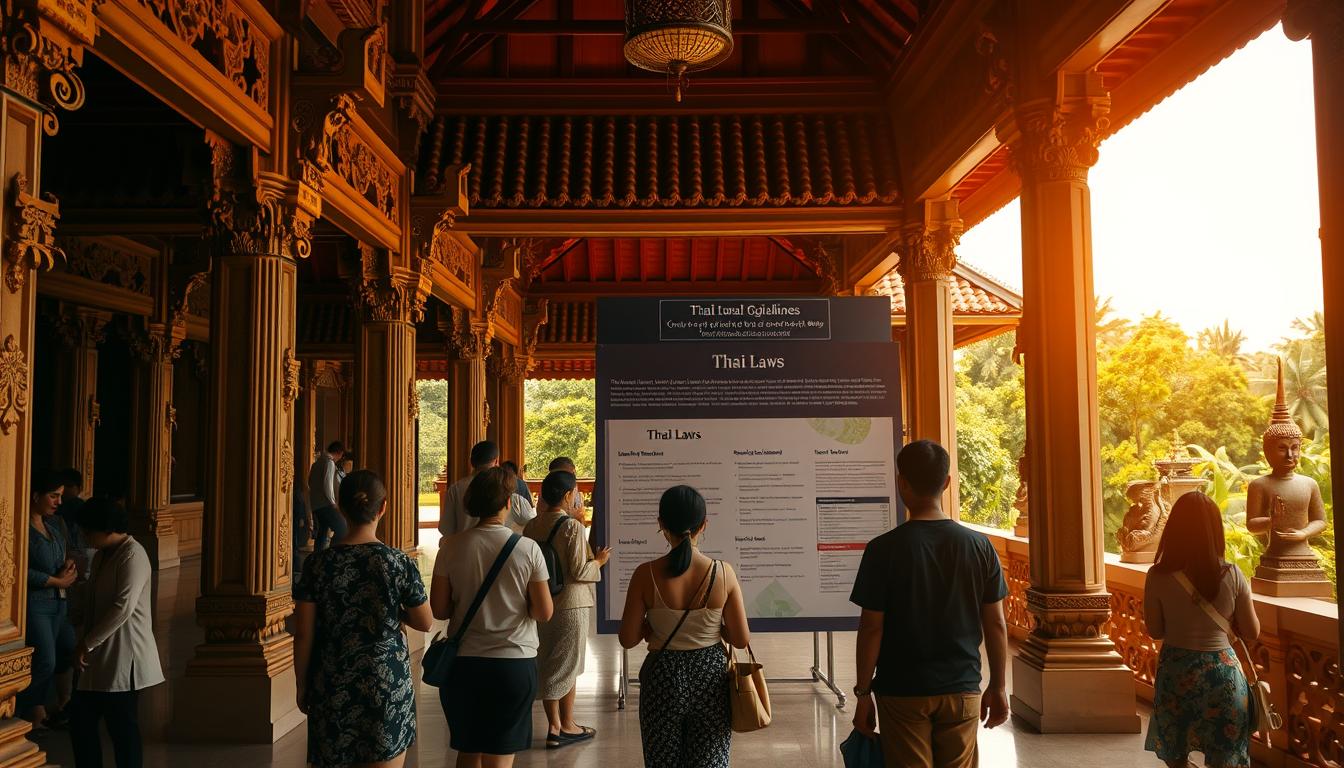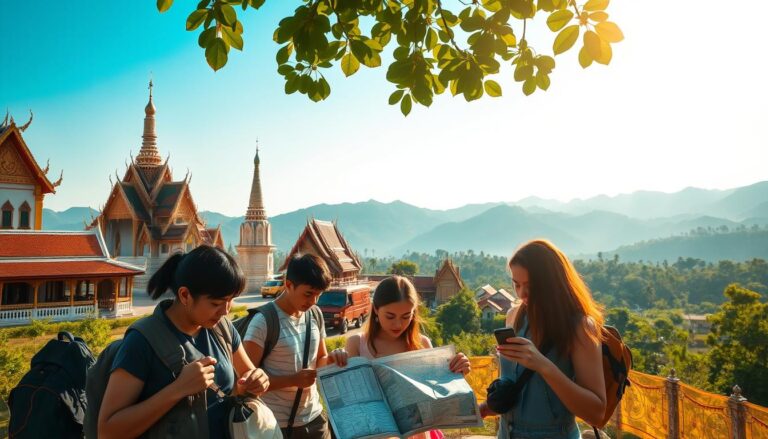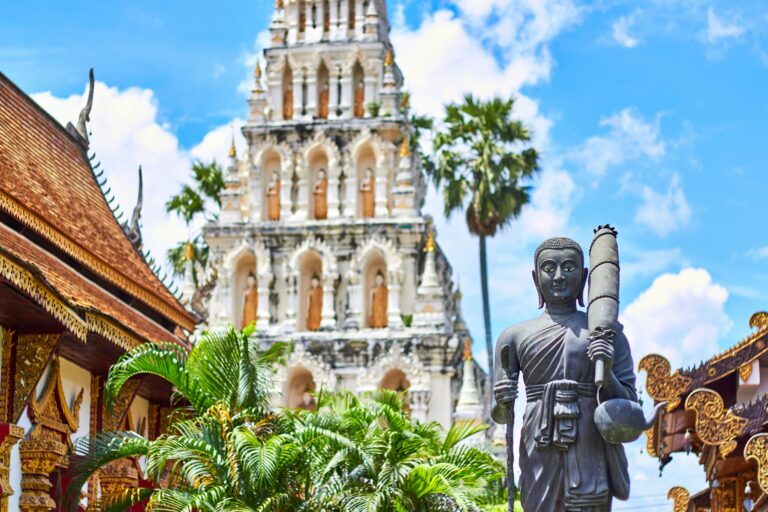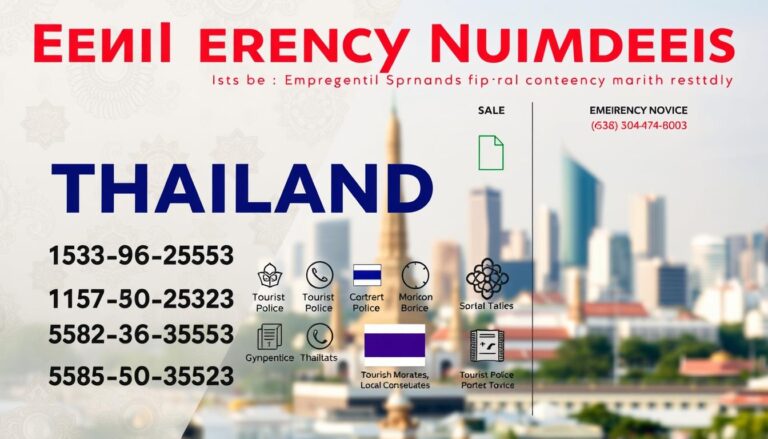Thailand Etiquette and Laws: Avoid Mistakes, Stay Safe
Planning a trip to Thailand? It’s key to know that respecting local customs and laws is vital for a smooth trip. With over 39 million tourists each year, it’s easy to get swept up in the fun. But remember, don’t assume “anything goes” in this lovely country.
To have a safe and fun time, you must know the local etiquette and laws. Being aware of these customs and rules helps you stay out of trouble and enjoy your stay in this beautiful place.
Key Takeaways
- Understand the importance of respecting local customs and laws
- Familiarise yourself with Thai etiquette to avoid unintended offence
- Learn about the laws that govern everyday life in Thailand
- Discover how to stay safe while travelling in Thailand
- Make the most of your journey by being culturally aware
Understanding Thai Culture and Values
To truly appreciate Thailand, it’s key to understand its cultural values and customs. Exploring this vibrant country will be more enjoyable if you know its cultural norms. This knowledge will also help you avoid unintentional offense.
The Importance of “Face” and Respect
In Thai culture, “face” is very important. It means dignity, reputation, and social standing. Keeping someone’s “face” intact is vital in social interactions. Actions that cause someone to lose face can lead to embarrassment and loss of respect.
Respect is deeply ingrained in Thai society. People greet each other with a wai (a prayer-like gesture with the hands) and use polite language. When visiting temples or attending cultural events, it’s important to show respect through your attire and behavior.
The Role of Buddhism in Daily Life
Buddhism is a big part of Thai culture and daily life. Most Thais are Buddhists, and Buddhist principles shape many aspects of society. You’ll see temples and monks everywhere, and participating in Buddhist ceremonies can be a meaningful experience.
When visiting temples, dress modestly and remove your shoes when asked. It’s also important to be respectful around monks and Buddha images. Knowing the basics of Buddhist practices will help you navigate these situations with grace.
Thai Concept of Time and Relationships
The Thai concept of time is more flexible than in many Western cultures. Punctuality is not always strict, but it’s polite to be on time at formal events or meetings.
Building relationships in Thailand is based on trust and personal connections. Taking the time to establish a rapport with locals will enhance your experience. Being patient and understanding in your interactions will help you build meaningful relationships during your stay.
Royal Family Respect: Non-Negotiable Rules
When you visit Thailand, it’s key to know the strict laws and customs about the royal family. The monarchy is highly respected. Showing respect is not just about being polite but also a legal must.
Lèse-Majesté Laws and Consequences
Thailand has very strict lèse-majesté laws. These laws make it a crime to insult, defame, or threaten the royal family. These laws are very serious, and breaking them can lead to harsh penalties, like long prison sentences.
Tourists are not exempt from these laws, and not knowing them is not a defence. The penalties for breaking these laws can be severe, with sentences ranging from several years to life imprisonment. Even small mistakes, like a joke or careless comment, can have serious legal consequences.
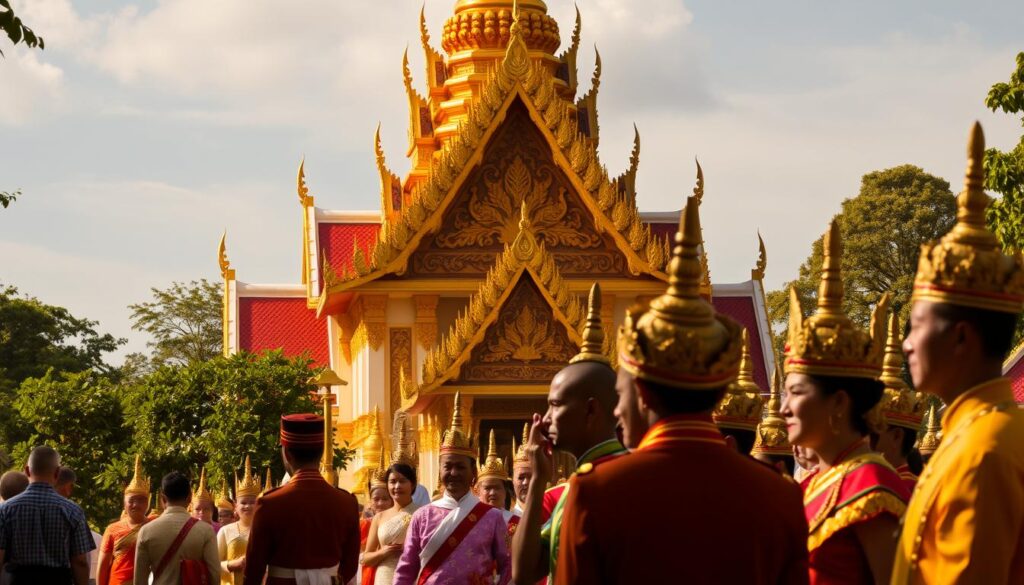
Proper Behavior Regarding Royal Images
It’s very important to show great respect for royal images. This means:
- Not damaging or defacing images of the royal family
- Not using royal images in a way that’s derogatory
- Making sure any depiction of the monarchy is done with dignity and respect
Visitors should be careful and avoid any behaviour that could be seen as disrespectful to the royal family.
Discussing the Monarchy: What Not to Say
Be careful when talking about the Thai monarchy. Avoid making negative comments or jokes, as they can be seen as offensive. Even in private, it’s important to remember that you never know who might be listening. The best thing to do is to not talk about the monarchy unless you’re sure it’s safe to do so.
Royal Establishments and Events
When you visit places related to the monarchy or attend events, dress modestly and follow any instructions. Be respectful of any rituals or ceremonies you see, and don’t disrupt them. Some important things to remember include:
- Dressing conservatively
- Following instructions from officials
- Being mindful of your behaviour and avoiding disruptions
By respecting the Thai royal family and following the laws and customs, you can have a safe and enjoyable trip to Thailand.
Essential Temple Etiquette
Exploring Thailand’s rich culture means learning temple etiquette. This knowledge makes your visit better and helps you connect with locals. Thailand’s temples are not just beautiful buildings but also sacred places where respect is key.
Dressing Modestly for Temple Visits
Dressing modestly is important when visiting Thai temples. This shows respect by covering your shoulders and knees. Also, wear clothes that are easy to remove, as you’ll often need to take off your shoes inside.
- Wear long pants or skirts that cover the knees.
- Choose tops that cover your shoulders.
- Avoid clothing with offensive or inappropriate graphics.
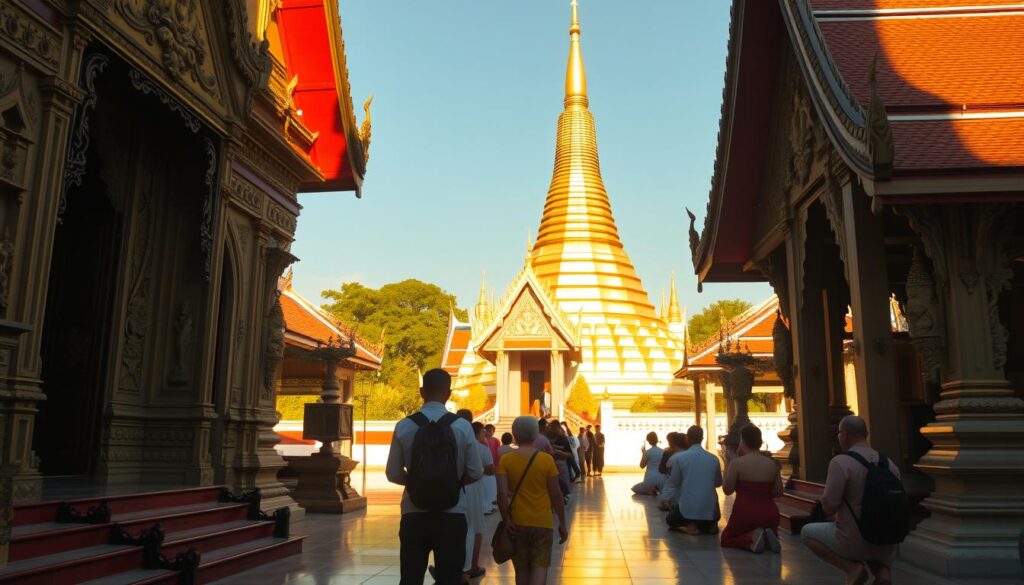
Behaviour Around Monks and Buddha Images
There are rules for behaviour around monks and Buddha images. Women should be careful when interacting with monks. It’s best not to hand anything directly to a monk or touch their belongings.
- Men and women should bow their heads when passing a monk.
- Avoid touching or pointing at Buddha images with your feet.
- Maintain a respectful distance and posture when near sacred objects.
Photography and Touching Rules
Photography is okay in most temples, but be respectful. Don’t take pictures of sacred objects or ceremonies without permission. Also, avoid using flash or intrusive photography that might disturb others.
- Refrain from taking selfies with Buddha images or in areas considered sacred.
- Never touch or climb on Buddha statues or other sacred objects.
Participating in Religious Ceremonies
If you’re invited to a religious ceremony, follow the lead of locals or monks. Knowing a bit about Buddhist practices can make your experience better and show respect for the culture.
- Observe and follow the actions of the participants around you.
- Be mindful of your body language and posture.
- Participate respectfully and quietly, avoiding disruptions.
Following these guidelines helps you avoid unintentionally offending locals. It also makes your travel in Thailand more enjoyable. Respecting cultural norms and social customs is essential for a harmonious and enjoyable journey.
Social Customs and Greetings
Exploring Thailand means learning its social customs and greetings. This knowledge helps you interact with locals confidently and respectfully. It’s key for a smooth and enjoyable trip.
The Wai: How to Perform It Correctly
The wai is a traditional Thai greeting. You place your palms together at chest level and bow your head slightly. It shows respect and is used for greetings and farewells.
To wai correctly, keep your hands at chest level and bow your head a bit. The length of the wai varies based on the person’s status. For example, you wai longer for someone older or of higher status.
When someone wais you, it’s polite to return the gesture. But, the wai is not used for children or those of lower status. Knowing when to wai and how to respond shows respect for Thai culture.
Physical Contact and Personal Space
Thais stand with their arms by their sides and avoid touching strangers. Public displays of affection are not common, and even less so between the same sex. Be careful with personal space and avoid touching or standing too close.
The head is sacred in Thai culture, so don’t touch it. Also, pointing your feet at someone or something is rude. Feet are considered the lowest and most impolite part of the body.
Gift-Giving Protocols
When giving gifts, use both hands and the wai as a sign of respect. Gifts should be nicely wrapped, and the act of giving is more important than the gift itself. Avoid expensive or extravagant gifts to avoid creating an obligation.
Some gifts, like clocks, are unlucky because their Thai name sounds like “death.” Choosing thoughtful gifts helps avoid unintended offense.
Language Considerations and Basic Phrases
Many Thais in tourist areas speak some English. But, learning basic Thai phrases enhances your experience. Saying “sawatdee” (hello), “khop khun krap” (thank you), and “mai ow hai” (excuse me) shows respect for the culture.
Using these phrases shows you’re making an effort to engage with the local culture. It can lead to more positive interactions with locals during your travels.
Thailand Etiquette & Laws: Avoid Mistakes, Stay Safe in Public Spaces
To have a great time in Thailand, knowing the public space rules is key. Learning about local customs and laws makes your trip better. It helps you feel at ease in the lively streets and public areas.
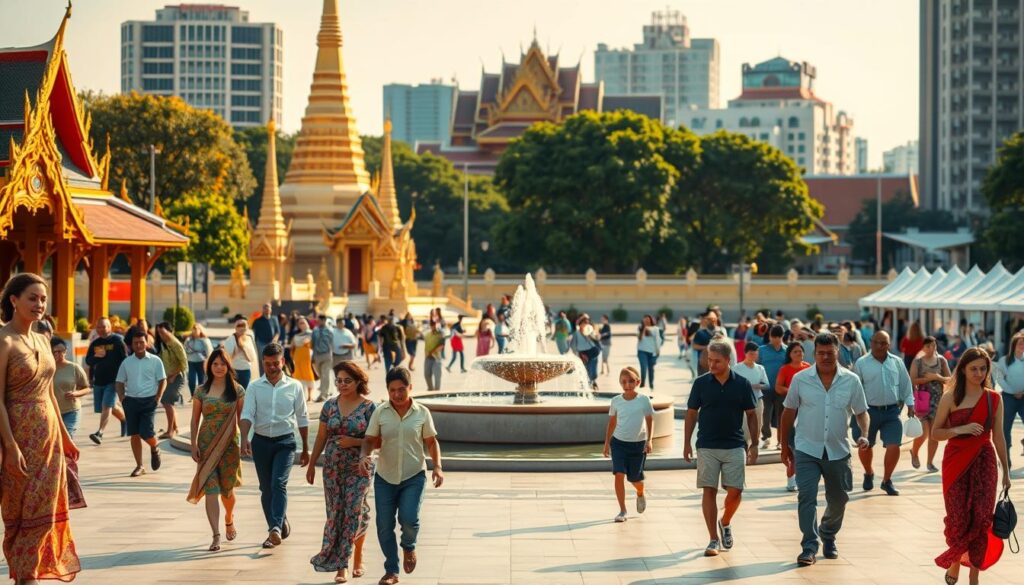
Dress Code Expectations
Thailand values modesty, and dressing right shows respect. Wear clothes that cover your shoulders and knees to avoid upsetting anyone. In some places, people dress more conservatively, so it’s good to follow their example.
- Choose loose, comfortable clothes for the weather.
- Avoid clothes that show too much, like in temples or rural areas.
- Bring a scarf or shawl to cover your shoulders when needed.
Public Display of Affection
In Thailand, public displays of affection are generally frowned upon, except in some places. Holding hands is okay, but more intimate actions might cause trouble.
- Be aware of local views on PDA.
- Keep affectionate displays to a minimum.
- Remember, some areas are more conservative than others.
Behaviour on Public Transport
Being polite on public transport in Thailand is important. Give up your seat to monks, elderly, or pregnant people as a sign of respect. Also, keep your voice down and don’t eat smelly foods on buses or trains.
- Be ready to give up your seat when asked.
- Keep your things safe and be alert.
- Don’t talk loudly or cause a disturbance.
Dining Etiquette and Table Manners
Eating in Thailand is more than just enjoying food. It’s customary to use your right hand when eating, as the left hand is seen as unclean. Also, wait for the host to start eating before you do.
- Eat with your right hand, or both hands if using utensils.
- Wait for the host to start eating before you start.
- Try a bit of everything to show you appreciate the meal.
By following these etiquette tips, you can enjoy Thailand’s public spaces confidently. This way, you show respect for the local culture and have a safe, fun trip.
Critical Laws Tourists Must Know
To stay safe in Thailand, it’s key to know the country’s laws. Thailand has strict rules for many parts of life. As a tourist, knowing these laws helps avoid big penalties.
Drug Laws and Severe Penalties
Thailand’s drug laws are very strict. Breaking these laws can mean the death penalty. Even small amounts of drugs can lead to long prison sentences.
It’s vital to stay away from drugs. This includes possession, use, or selling. Getting caught can mean jail, fines, or even death.
Alcohol Regulations and Drinking Hours
Thailand has rules about alcohol sales and use. Knowing when you can buy and drink alcohol is important.
For example, alcohol sales stop on election days, Buddhist holidays, and special events. Some places also have their own alcohol rules.
Visa Requirements and Overstay Penalties
Following Thailand’s visa rules is a must. Staying longer than allowed can lead to fines and penalties.
Overstaying your visa can cost up to 500 THB per day. In serious cases, you might face jail or be deported.
Environmental Protection Laws
Thailand protects its environment with laws. These include rules on littering, smoking, and wildlife. It’s important to respect the environment while you’re there.
Littering can get you fined, and smoking is banned in places like public parks and beaches. Also, be kind to wildlife and don’t harm the environment.
Common Scams and How to Avoid Them
Traveling to Thailand can be fun if you know how to dodge scams. Scams target tourists at popular spots, through transport, and in shops. Knowing about these scams can save you money.
Tourist Attraction Scams
Scams at tourist hotspots include overpriced tickets and fake tours. Always buy tickets from official places. Watch out for friendly locals with “deals” that seem too good.
“A smooth sea never made a skilled sailor.” Being ready for scams can make your trip better.
Transport and Tuk-Tuk Schemes
Always agree on the fare with tuk-tuk or taxi drivers before you start. Some drivers might take longer routes to charge more. Use trusted taxi services or apps to avoid mistakes.
- Use metered taxis or tuk-tuks with a clearly marked rate.
- Be aware of your surroundings and keep your belongings secure.
- Don’t get into a tuk-tuk if the driver is unwilling to use the meter.
Gem and Shopping Frauds
Gem scams are common in Thailand, where tourists buy fake or overpriced gems. To stay safe, avoid buying from street vendors or shops with “once-in-a-lifetime” deals. Researching reputable jewelers and comparing prices helps.
“The biggest risk is not taking any risk.” Knowing about gem scams helps you shop safely in Thailand.
Rental Vehicle Scams
Be careful of hidden fees or damages when renting cars. Always check the vehicle before renting and take photos of any damage. Understanding the rental agreement helps avoid mistakes and disputes when returning the vehicle.
By being informed and careful, you can enjoy Thailand while avoiding scams. A bit of preparation ensures your safety and a successful trip.
Health and Safety Essentials
Before you head to Thailand, think about health and safety. Knowing what to do and what to watch out for makes your trip better. It ensures you have a good time in this lovely country.
Emergency Contact Numbers
Having the right numbers for emergencies is key. In Thailand, call 191 or 1669 for police, fire, and ambulance. Also, keep your embassy or consulate’s details handy.
Healthcare Access for Tourists
Thailand offers great medical care, with many places for tourists. Big cities like Bangkok and Chiang Mai have top-notch hospitals. Some doctors even speak English. But, make sure your travel insurance covers medical costs in Thailand.
Weather Hazards and Seasonal Considerations
Thailand’s weather can be tough, with hot, rainy, and cool seasons. The rainy season, from May to October, can be very wet. Keep an eye on the weather forecast and be ready for it. In the hot season, drink lots of water and avoid too much sun to avoid getting sick.
Food and Water Safety
Eating out in Thailand is exciting, but be careful. Choose safe places and avoid raw or undercooked foods. Don’t drink tap water; use bottled or filtered water instead. Check the seal of bottled water to avoid fake ones.
Knowing these health and safety tips can help you have a great time in Thailand. Stay informed and take the right steps to enjoy everything this country offers safely.
Conclusion: Enjoying Thailand Respectfully and Safely
Understanding Thai etiquette and laws is key to a safe and enjoyable trip. Knowing local customs and rules helps you avoid cultural mistakes and legal problems.
When visiting temples, dress modestly and respect the royal family. Be careful with your behaviour in public. Knowing the local laws and customs makes everyday situations easier.
Being respectful in Thailand makes your trip better and helps you connect with locals. Follow the tips in this article to enjoy Thailand safely and avoid mistakes.

